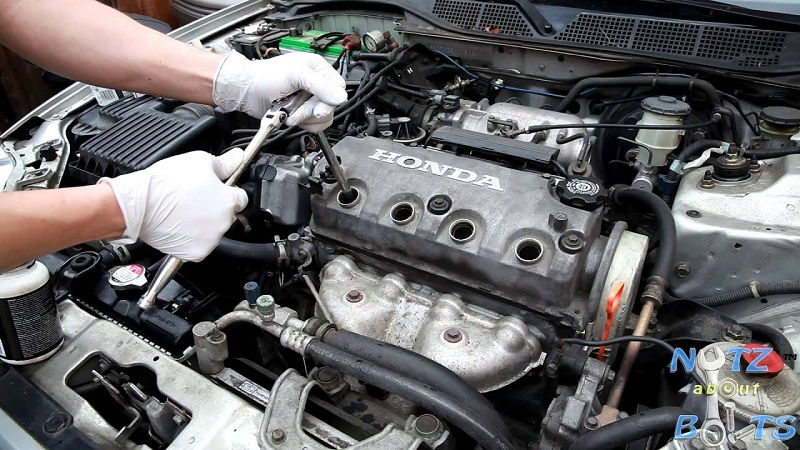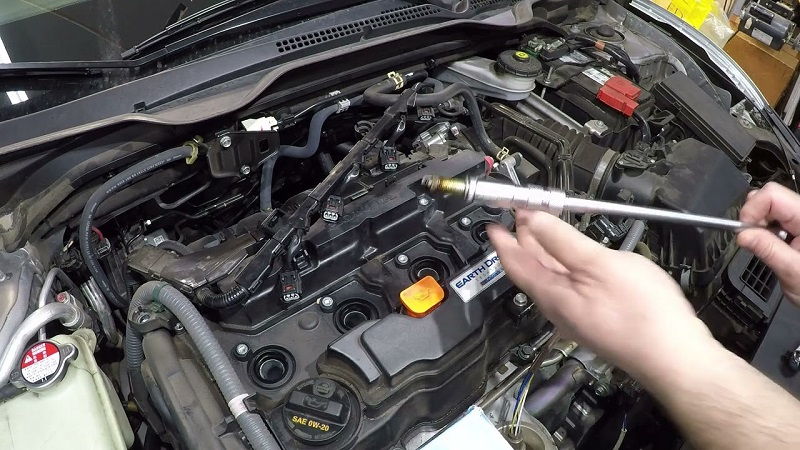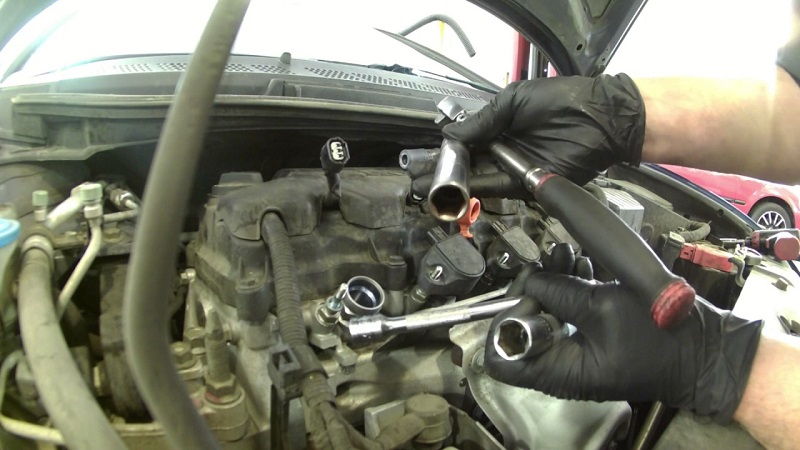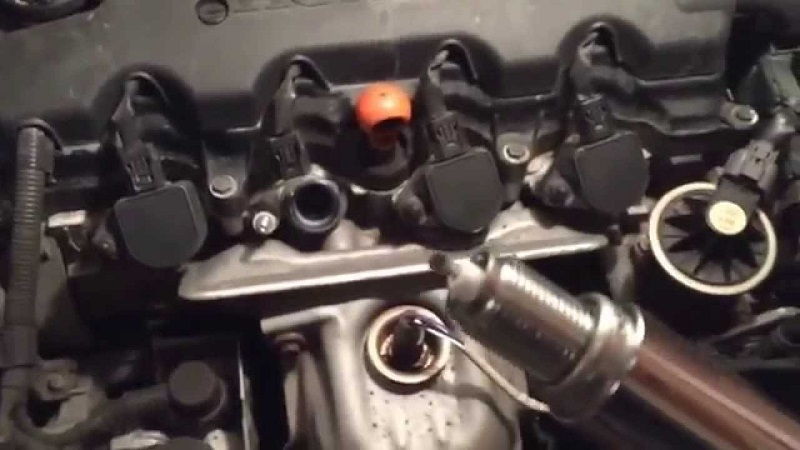This post contains affiliate links. This means I will make a commission at no extra cost to you should you click through and make a purchase [ “As an Amazon Associate, I earn from qualifying purchases.” ]. Read the full disclosure here.
Honda Civic Spark Plug Replacement GuideMechanic.Com Are you experiencing a decrease in your Honda Civic’s fuel efficiency or noticing a rough idle? It might be time to replace your spark plugs.
Spark plug replacement is an essential maintenance task to ensure your vehicle’s engine runs smoothly and efficiently.
In this comprehensive guide, we will walk you through the step-by-step process of replacing spark plugs in your Honda Civic, helping you optimize your car’s performance and fuel economy.
Understanding the Importance of Spark Plug Maintenance

Spark plugs are a vital component of your Honda Civic’s engine. They play a crucial role in igniting the air-fuel mixture within the combustion chamber, ultimately powering your vehicle.
Over time, spark plugs can wear out or become fouled, leading to decreased engine performance, reduced fuel efficiency, and potential engine misfires.
Regular maintenance and timely replacement of spark plugs will ensure optimal combustion, ignition timing, and overall engine efficiency.
Contributing to Fuel Combustion
Spark plugs are responsible for creating the spark that ignites the air-fuel mixture in the combustion chamber.
This controlled ignition is essential for fuel combustion, allowing the engine to generate power and propel your Honda Civic forward.
See Also: G37 Spark Plug Replacement
Worn-out or faulty spark plugs can result in incomplete combustion, leading to decreased engine power and increased fuel consumption.
Impact on Ignition Timing
Proper ignition timing is crucial for optimal engine performance. Spark plugs play a significant role in maintaining the correct timing by providing a timely spark to ignite the air-fuel mixture during each engine cycle.
Faulty spark plugs can disrupt the ignition timing, causing misfires, engine knocking, and decreased power. Regular maintenance and replacement of spark plugs will help ensure precise ignition timing, resulting in smoother engine operation.
Enhancing Overall Engine Efficiency
Efficient engine operation directly impacts fuel economy and overall performance. By replacing your Honda Civic’s spark plugs regularly, you can maximize engine efficiency.
New spark plugs provide a stronger spark, ensuring complete combustion of the air-fuel mixture. This results in improved fuel efficiency, reduced emissions, and enhanced engine responsiveness.
Identifying the Right Spark Plugs for Your Honda Civic

Choosing the correct spark plugs for your Honda Civic is essential to ensure optimal performance and longevity.
With various spark plug options available, it’s important to select the right type, heat range, and electrode material specific to your vehicle’s model and engine. By understanding these factors, you can make an informed decision and improve your Honda Civic’s performance.
Different Spark Plug Types
There are several types of spark plugs available, including copper, platinum, and iridium. Each type has its advantages and considerations.
Copper spark plugs are cost-effective and offer excellent heat dissipation, making them suitable for older Honda Civic models.
Platinum and iridium spark plugs, on the other hand, provide enhanced durability and better performance, making them ideal for newer vehicles.
See Also: Best Replacement Spark Plugs for 5.4 Triton
Understanding the differences between these spark plug types will help you choose the most suitable option for your Honda Civic.
Heat Range Considerations
The heat range of a spark plug refers to its ability to dissipate heat from the combustion chamber. It’s crucial to select the appropriate heat range for your Honda Civic’s engine to prevent overheating or fouling.
A higher heat range is suitable for high-performance engines, as it dissipates heat quickly. Conversely, a lower heat range is suitable for engines that operate at lower temperatures. Consult your vehicle’s manual or seek professional advice to determine the optimal heat range for your Honda Civic.
Electrode Material Selection
The electrode material of a spark plug affects its durability and performance. Copper spark plugs have a copper core electrode, while platinum and iridium spark plugs feature electrodes made of their respective materials.
Copper spark plugs are more prone to erosion but are cost-effective. Platinum spark plugs offer better durability and performance, while iridium spark plugs provide the highest level of durability and performance. Consider your budget and driving needs when selecting the electrode material for your Honda Civic.
Gathering the Necessary Tools and Materials

Before embarking on the spark plug replacement process, it’s important to gather all the necessary tools and materials. Having everything prepared in advance will ensure a smooth and efficient replacement process, saving you time and potential frustration.
Tool Checklist
Make sure you have the following tools readily available:
- A socket wrench
- A spark plug socket with the appropriate size
- A spark plug gap tool
- A torque wrench
- A ratchet extension
- A 3/8-inch or 1/2-inch drive socket set
- A gap gauge
- A wire brush
- A dielectric grease
Material Checklist
In addition to the tools, gather the following materials:
- The appropriate spark plugs for your Honda Civic
- Anti-seize lubricant
- A clean cloth or rag
- A can of compressed air
- A service manual or online guide for your specific Honda Civic model
Step-by-Step Guide to Replace Spark Plugs
Now that you have all the necessary tools and materials, it’s time to replace the spark plugs in your Honda Civic. Follow these detailed steps to ensure a successful and efficient replacement process:
Step 1: Prepare Your Vehicle
Park your Honda Civic on a level surface and engage the parking brake. Open the hood and allow the engine to cool down before proceeding with the replacement process.
Step 2: Locate the Spark Plugs
The location of the spark plugs may vary slightly depending on your Honda Civic’s model and engine type. Refer to your vehicle’s service manual or consult an online guide to locate the spark plugs. In most cases, you will find them on top of the engine, connected to the ignition coils.
Step 3: Remove the Ignition Coils
Before accessing the spark plugs, you need to remove the ignition coils that cover them. Use a socket wrench and the appropriate socket size to loosen and remove the bolts securing the ignition coils. Carefully disconnect the electrical connectors from each ignition coil and set them aside.
Step 4: Remove the Old Spark Plugs
With the ignition coils out of the way, you can now access the spark plugs. Attach the spark plug socket to your socket wrench and carefully loosen and remove each spark plug.
See Also: Spark Plug Replacement Cost
Pay attention to the condition of the old spark plugs, as it can provide insights into your engine’s performance and potential issues.
Step 5: Inspect and Clean the Spark Plug Wells
While the spark plugs are removed, take the opportunity to inspect the spark plug wells for any debris, oil, or dirt. Use a can of compressed air and a clean cloth or rag to remove any contaminants and ensure a clean working area.
Step 6: Check the Spark Plug Gap
Before installing the new spark plugs, it’s important to check and adjust the spark plug gap. The gap refers to the distance between the center electrode and the ground electrode.
Refer to your vehicle’s service manual or the spark plug manufacturer’s specifications to determine the correct gap measurement. Use a gap gauge to check the gap and adjust it as needed using a gap tool.
Step 7: Apply Anti-Seize Lubricant
To prevent the spark plugs from seizing in the engine block, apply a thin layer of anti-seize lubricant to the threads of each new spark plug. Be cautious not to over-apply the lubricant, as excessive amounts can interfere with proper electrical conductivity.
Step 8: Install the New Spark Plugs
Insert each new spark plug into the spark plug socket and carefully thread it into the spark plug well by hand.
Once finger-tight, use the spark plug socket and a torque wrench to tighten the spark plugs to the manufacturer’s specified torque.
Over-tightening can damage the spark plugs or the cylinder head, while under-tightening can lead to poor electrical connections.
Step 9: Reinstall the Ignition Coils
With the new spark plugs securely in place, it’s time to reinstall the ignition coils. Connect the electrical connectors to each ignition coil and slide them back onto the spark plugs. Use your socket wrench and the appropriate socket size to tighten the bolts securing the ignition coils.
Step 10: Test the New Spark Plugs
Once you have completed the spark plug replacement, start your Honda Civic’s engine and listen for any abnormalities.
Take your vehicle for a test drive and pay attention to the engine’s smoothness, responsiveness, and overall performance. If everything feels and sounds normal, congratulations on successfully replacing your spark plugs!
Tips and Best Practices for Spark Plug Replacement
Replacing spark plugs in your Honda Civic can be a straightforward process, but following these tips and best practices will ensure the best possible outcome:
Refer to Your Vehicle’s Service Manual
Your Honda Civic’s service manual is a valuable resource that provides specific instructions and guidelines for spark plug replacement.
It contains detailed diagrams, torque specifications, and other important information that will help you perform the task correctly. Always consult the service manual before starting any maintenance procedure.
Use the Correct Torque Specifications
Tightening the spark plugs to the manufacturer’s specified torque is crucial to prevent damage to the spark plugs or the engine.
See Also: 2011 Honda Pilot Spark Plugs
Over-tightening can strip the threads, while under-tightening can result in loose connections and decreased performance. Use a torque wrench and follow the recommended torque settings for your specific Honda Civic model.
Apply Dielectric Grease
Dielectric grease is an electrical insulator that helps protect the spark plug connections from moisture and corrosion.
Before reconnecting the ignition coils, apply a small amount of dielectric grease to the inside of each electrical connector.
This will ensure a secure and moisture-resistant connection, improving the longevity of your spark plugs.
Replace the Ignition Coils if Necessary
If you notice any signs of damage or wear on the ignition coils during the spark plug replacement process, it’s advisable to replace them.
Faulty ignition coils can cause misfires and other engine performance issues, even with new spark plugs. Investing in new ignition coils can ensure optimal engine performance and prevent potential problems down the road.
Keep a Spark Plug Replacement Schedule
Regularly replacing your Honda Civic’s spark plugs is essential for maintaining optimal engine performance.
Create a schedule based on your vehicle’s recommended replacement interval and stick to it. By proactively replacing the spark plugs, you can prevent potential issues and enjoy consistent performance and fuel efficiency.
Signs of Spark Plug Problems and When to Replace Them
Recognizing the signs of worn-out or faulty spark plugs is crucial for maintaining optimal engine performance. Here are some common symptoms that indicate your Honda Civic’s spark plugs may need replacement:
Decreased Fuel Efficiency
If you notice a sudden decrease in your Honda Civic’s fuel efficiency, it could be a sign of worn-out spark plugs. As spark plugs deteriorate, they may not ignite the air-fuel mixture effectively, leading to incomplete combustion and increased fuel consumption. Replacing the spark plugs can restore fuel efficiency and save you money at the pump.
Rough Idle or Engine Misfires
A rough idle or engine misfires are clear indicators of spark plug problems. If your Honda Civic’s engine is not running smoothly or you experience a noticeable loss of power during acceleration, it’s likely that the spark plugs are not functioning optimally. Replacing them can resolve these issues and restore the engine’s smooth operation.
Difficulty Starting the Engine
Worn-out spark plugs can make it harder to start your Honda Civic’s engine, especially in cold weather. If you find yourself struggling to start the vehicle or notice prolonged cranking before the engine fires up, it’s a good indication that the spark plugs need replacement. New spark plugs will provide a strong and consistent spark, ensuring reliable starting performance.
Engine Knocking or Pinging Sounds
If you hear unusual knocking or pinging sounds coming from your Honda Civic’s engine, it could be a result of faulty spark plugs.
As spark plugs wear out, they can cause improper combustion, leading to these abnormal sounds. Replacing the spark plugs will eliminate the knocking or pinging noises and restore engine smoothness.
Frequently Asked Questions about Spark Plug Replacement
Here are answers to commonly asked questions about spark plug replacement:
Q: How often should I replace my Honda Civic’s spark plugs?
A: The recommended spark plug replacement interval varies depending on your Honda Civic’s model and engine type.
Generally, it’s advisable to replace spark plugs every 30,000 to 100,000 miles. Refer to your vehicle’s service manual or consult a trusted mechanic for the specific interval for your Honda Civic.
Q: Can I use different spark plug brands?
A: While it’s generally recommended to use the same brand and type of spark plugs that came with your Honda Civic, using different brands can be acceptable as long as they meet the manufacturer’s specifications.
However, be cautious of using low-quality or incompatible spark plugs, as they may negatively impact engine performance and longevity.
Q: What are the risks of not replacing spark plugs promptly?
A: Neglecting spark plug replacement can lead to various issues, including decreased engine performance, reduced fuel efficiency, engine misfires, and potential damage to other engine components.
See Also: 2006 BMW 325i Spark Plugs Replacement
Timely spark plug replacement is crucial for maintaining optimal engine operation and preventing costly repairs in the future.
Benefits of Regular Spark Plug Maintenance
Regularly maintaining your Honda Civic’s spark plugs offers several long-term benefits:
Improved Fuel Efficiency
By replacing worn-out spark plugs, you can restore optimal combustion and improve fuel efficiency. Properly functioning spark plugs ensure efficient burning of the air-fuel mixture, reducing fuel consumption and maximizing mileage.
Enhanced Engine Performance
Fresh spark plugs provide a strong and consistent spark, leading to improved engine performance. Your Honda Civic will run smoother, accelerate more effectively, and deliver better overall power and responsiveness.
Reduced Emissions
Optimal combustion facilitated by new spark plugs results in lower emissions. By replacing your Honda Civic’s spark plugs regularly, you contribute to a cleaner environment by reducing harmful pollutants released into the atmosphere.
Prolonged Engine Lifespan
Worn-out spark plugs can cause stress on other engine components and lead to premature wear and damage. By maintaining and replacing spark plugs, you reduce the risk of costly engine repairs and extend the overall lifespan of your Honda Civic’s engine.
Professional vs. DIY Spark Plug Replacement
Deciding whether to replace the spark plugs yourself or seek professional assistance depends on various factors:
Cost Considerations
DIY spark plug replacement typically costs less than hiring a professional mechanic. By following the step-by-step instructions provided in this guide and investing in the necessary tools, you can save money.
However, if you lack the tools or confidence to perform the task properly, it may be worth paying for professional assistance.
Time Commitment
Replacing spark plugs can be a time-consuming task, especially if you’re unfamiliar with the process. DIY replacement requires gathering tools, researching the correct procedure, and taking the time to complete each step carefully.
If you have a busy schedule or prefer not to invest the time, professional spark plug replacement might be the better option.
Expertise and Experience
If you have experience with car maintenance and feel confident in your abilities, DIY spark plug replacement can be a rewarding and cost-effective option.
However, if you’re unsure about the process or lack the necessary knowledge, it’s advisable to leave the task to a professional mechanic who has the expertise to perform the replacement correctly.
Personal Preference
Some car owners simply prefer to let professionals handle all maintenance tasks, ensuring peace of mind and a job done right. Others enjoy the satisfaction and cost savings that come with DIY maintenance.
Consider your personal preference and comfort level when deciding whether to tackle spark plug replacement yourself or seek professional assistance.
Wrapping Up
Regular maintenance and timely replacement of spark plugs are crucial for optimizing your Honda Civic’s performance and fuel economy.
By following the comprehensive guide provided here, you have all the information and instructions needed to successfully replace your spark plugs.
Remember to consult your vehicle’s service manual and take necessary safety precautions during the process.
By prioritizing spark plug maintenance, you can ensure a smoother, more efficient driving experience and prolong the lifespan of your Honda Civic’s engine.
Related video of Honda Civic Spark Plug Replacement: A Comprehensive Guide for Optimal Performance
- Seafoam Catalytic Converter Cleaner: It Work & How to Use It? - April 18, 2025
- Rislone Catalytic Converter Cleaner: What It Is, How It Works - April 18, 2025
- Wynn’s Catalytic Converter Cleaner 325ml - April 17, 2025

